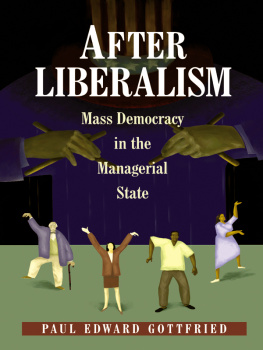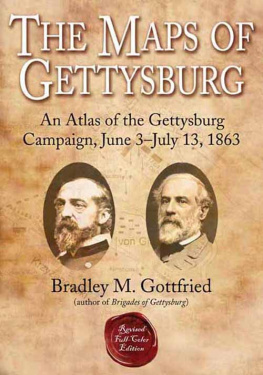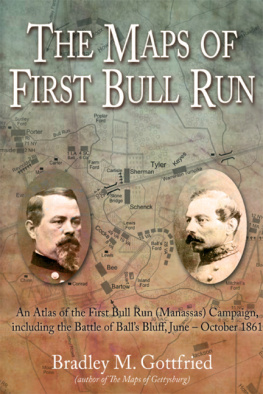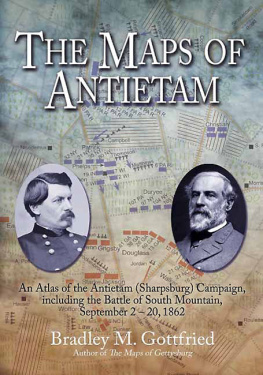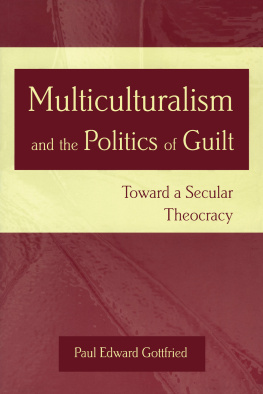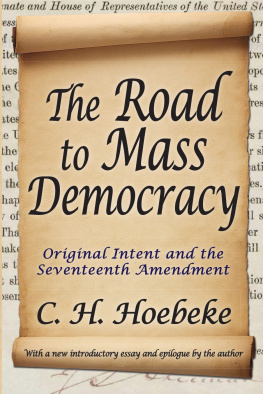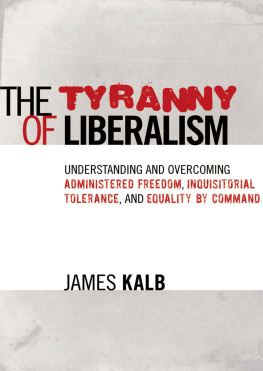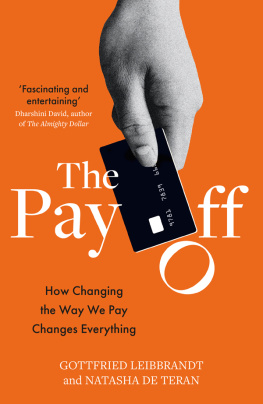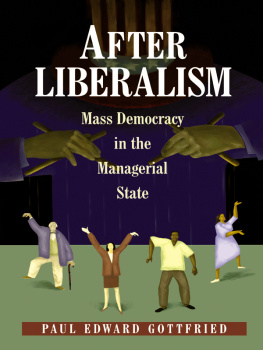Gottfried - After liberalism: mass democracy in the managerial state
Here you can read online Gottfried - After liberalism: mass democracy in the managerial state full text of the book (entire story) in english for free. Download pdf and epub, get meaning, cover and reviews about this ebook. City: Oxford, Princeton, NJ, year: 2001, publisher: Princeton University Press, genre: Politics. Description of the work, (preface) as well as reviews are available. Best literature library LitArk.com created for fans of good reading and offers a wide selection of genres:
Romance novel
Science fiction
Adventure
Detective
Science
History
Home and family
Prose
Art
Politics
Computer
Non-fiction
Religion
Business
Children
Humor
Choose a favorite category and find really read worthwhile books. Enjoy immersion in the world of imagination, feel the emotions of the characters or learn something new for yourself, make an fascinating discovery.
- Book:After liberalism: mass democracy in the managerial state
- Author:
- Publisher:Princeton University Press
- Genre:
- Year:2001
- City:Oxford, Princeton, NJ
- Rating:4 / 5
- Favourites:Add to favourites
- Your mark:
- 80
- 1
- 2
- 3
- 4
- 5
After liberalism: mass democracy in the managerial state: summary, description and annotation
We offer to read an annotation, description, summary or preface (depends on what the author of the book "After liberalism: mass democracy in the managerial state" wrote himself). If you haven't found the necessary information about the book — write in the comments, we will try to find it.
Gottfried: author's other books
Who wrote After liberalism: mass democracy in the managerial state? Find out the surname, the name of the author of the book and a list of all author's works by series.
After liberalism: mass democracy in the managerial state — read online for free the complete book (whole text) full work
Below is the text of the book, divided by pages. System saving the place of the last page read, allows you to conveniently read the book "After liberalism: mass democracy in the managerial state" online for free, without having to search again every time where you left off. Put a bookmark, and you can go to the page where you finished reading at any time.
Font size:
Interval:
Bookmark:

After Liberalism

NEW FORUM BOOKS
Robert P. George, Series Editor
A list of titles in the series appears at the back of the book
After Liberalism
MASS DEMOCRACY IN THE MANAGERIAL STATE

PAUL EDWARD GOTTFRIED
PRINCETON UNIVERSITY PRESS
PRINCETON, NEW JERSEY
Copyright 1999 by Princeton University Press
Published by Princeton University Press, 41 William Street, Princeton, New Jersey 08540
In the United Kingdom: Princeton University Press, Chichester, West Sussex
All Rights Reserved
Library of Congress Cataloging-in-Publication Data
Gottfried, Paul Edward
After liberalism : Mass democracy in the managerial state / Paul Edward Gottfried.
p. cm.(New forum books)
Includes bibliographical references and index.
ISBN 0-691-05983-7 (cl : alk. paper)
1. Welfare state. 2. Public administration. 3. Social engineering. 4. Liberalism. 5. Democracy. 6. Pluralism (Social sciences) 7. Populism.
I. Title. II. Series.
JC479.G67 1998
351DC21 98-9623 CIP
Acknowledgment is due to the following periodicals for graciously granting permission to republish parts of chapters 1, 2, and 3 of the present work that originally appeared in their pages: Society (vol. 32, no. 6, SeptemberOctober 1995, pp. 3951); The Journal of Libertarian Studies (vol. 12, no. 2, Fall 1996, pp. 23151); and Telos (vol. 104, Summer 1995, pp. 2750).
This book has been composed in New Baskerville
Princeton University Press books are printed on acid-free paper and meet the guidelines for permanence and durability of the Committee on Production Guidelines for Book Longevity
of the Council on Library Resources
http://pup.princeton.edu
Printed in the United States of America
1 3 5 7 9 10 8 6 4 2
 Contents
Contents
CHAPTER ONE |
CHAPTER TWO |
CHAPTER THREE |
CHAPTER FOUR |
CHAPTER FIVE |
 Introduction
Introduction
T HE 1996 U.S. election confirmed, if further substantiation was needed, the centrality of entitlement programs in American politics. The charge leveled repeatedly and effectively by President Bill Clinton was that his Republican rival Robert Dole would slash Medicare and other government allowances. Despite overwhelming public sentiment in favor of balancing budgets and shrinking government, as Gallup Polls revealed in Spring 1996, 53 percent of Americans opposed the cutting of social programs and 54 percent were against a significant reduction in military spending (this being a critical source of social entitlements and public sector jobs).
Whether Clinton and his strategists were engaging in demagoguery, as Krauthammer, Paul Craig Roberts, and other Republican journalists insist, is for this study beside the point. More relevant, Medicare and entitlements in general became the salient electoral issue, and the increasingly vague appeal to family values, which had belonged to the Republican rhetorical arsenal in the past, now worked to Clintons advantage. Family values came to signify the Family Leave bill and other social measures that the president had pushed through Congress. And though the majority of Americans stood to the right of Clinton on, among other moral issues, partial-birth abortion, the identification with a caring state enhanced his image as an upholder of family life.
This obviously accounts for much of Clintons appeal among women voters, as columnist Maggie Gallagher argued in the wake of the 1996
Although this distinction is correct, it may also be academic. Gallaghers observations simply prove that Clintons advisors calculated correctly: by associating family values with social programs, they won over the vast majority of single women, including those who appear to be ideologically to their right. They also further pushed the Republicans into awkwardly mimicking ambivalent polls, which showed that the majority of Americans want to reduce big government while protecting its results. Dole and other Republicans called for renouncing the collectivist Devil and his works but pledged to keep entitlement programs intact. They and Clinton found a symbolic way of ending the welfare state as we know it by signing a bill to reduce the cost of underclass welfare.
It is not surprising that entitlements in the United States have come to trump other political issues, all things being equal. The same thing has happened in Europe, where parties of the Right must steadily assure voters that they stand behind entitlements. In France the right-wing populist Front National has moved from advocating free enterprise to being an impassioned defender of working-class pensions and other government benefits. In Austria the regionalist and formerly pro-free-market Freiheitliche Partei has traveled a similar path, less successfully. In 1995 the party lost seats in the Austrian parliament because it failed to move fast enough to express support for existing entitlements. While European parties of the Right have taken the popular side in favoring immigration restrictions, they have often done so for reasons that to many seem less then compelling. They have made cultural arguments for their stand on immigration, when the popular reasons for support are chiefly physical and economic. Voters fear non-European alien residents, who are or who are thought to be associated with rising crime rates. Those invulnerable work situations are concerned about foreigners taking their jobs, and national populations are becoming anxious about the entitlement net being stretched too far.
Throughout this century but most noticeably in the last fifty years, this book argues, democratic practice has entailed less and less vigorous self-government, while becoming progressively dissociated from any specific cultural or ethnic heritage. Democratic citizenship has come to mean eligibility for social services and welfare benefits. It also imposes varying degrees of loyalty to what Jrgen Habermas calls constitutional patriotism: the acceptance of legal procedures and of democratic socialization, presumably to be carried out by social experts. Liberalism has also lost any meaningful connection to what it once signified. By now it is hard to find in contemporary liberal thinking much of what it stood for at the beginning of the century, save for talk about expressive and lifestyle freedoms (freedoms that nineteenth-century liberals might have had trouble in any case recognizing as rights). Our own liberal statements are no longer centered on the merits of distributed powers, the need to protect traditional civil society from an encroaching state, or bourgeois moral standards.
Todays liberal democracies express and accommodate other political concerns, from the need for entitlements to the combating of prejudice and the privileging by courts of lifestyle rights and designated minorities. In Europe, Canada, Australia, and New Zealand, governments have performed these tasks even more energetically than in the United States. There public administrations control incomes more directly, tax more heavily, and, together with courts, impose criminal punishments on those whose speech or writing offends ethnic minorities. Though this form of democratic governing leaves little to popular consent, it has enjoyed continuing popular support: whence the vexing problem for traditionalist and populist opponents of the current welfare state. They simply cannot convince a majority of people that those who provide, however ineptly, for their material needs are the enemies of democratic self-rule or are interfering unduly in family life. If people care little about such matters and are devoted to the present centralized system of social services, traditionalist and old-fashioned liberal or democratic arguments will not win the day. In this respect the political debate may already be over, despite the echo of populist rumblings in Europe.
Next pageFont size:
Interval:
Bookmark:
Similar books «After liberalism: mass democracy in the managerial state»
Look at similar books to After liberalism: mass democracy in the managerial state. We have selected literature similar in name and meaning in the hope of providing readers with more options to find new, interesting, not yet read works.
Discussion, reviews of the book After liberalism: mass democracy in the managerial state and just readers' own opinions. Leave your comments, write what you think about the work, its meaning or the main characters. Specify what exactly you liked and what you didn't like, and why you think so.

